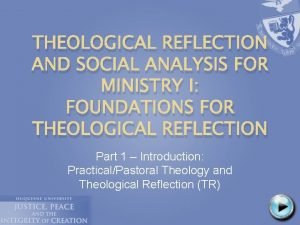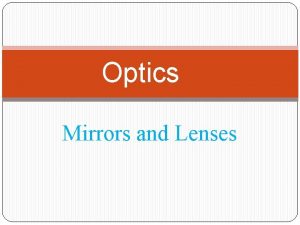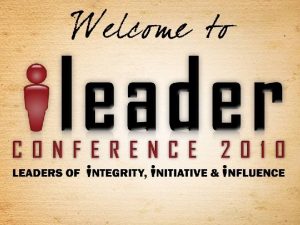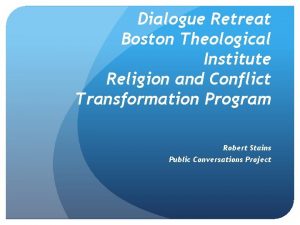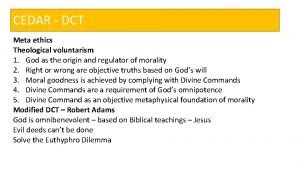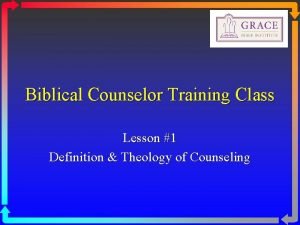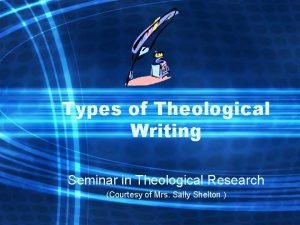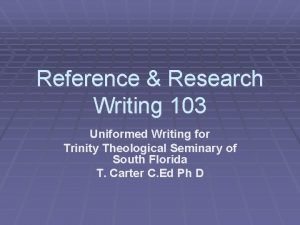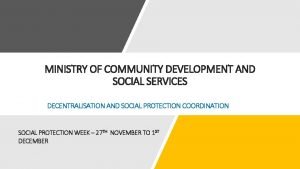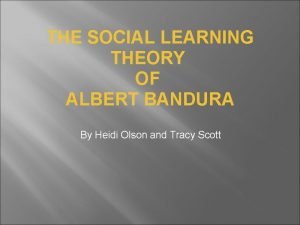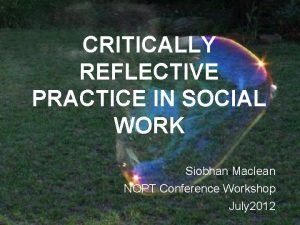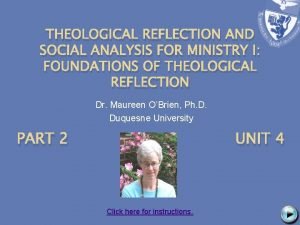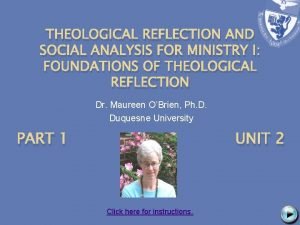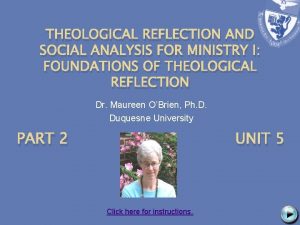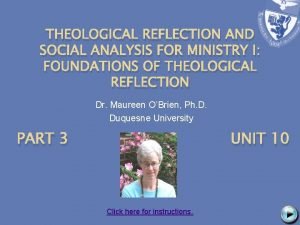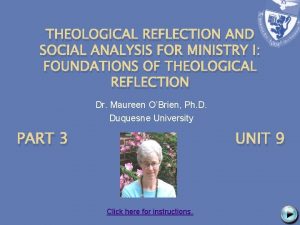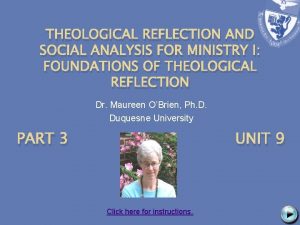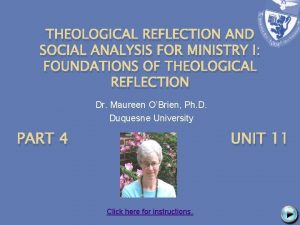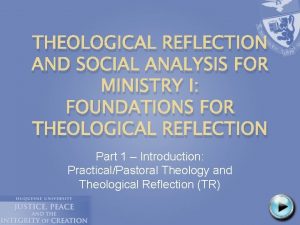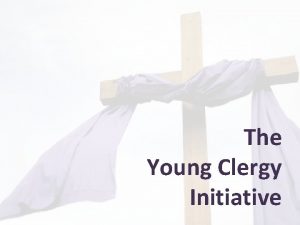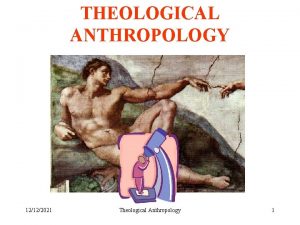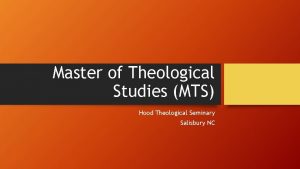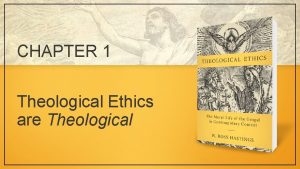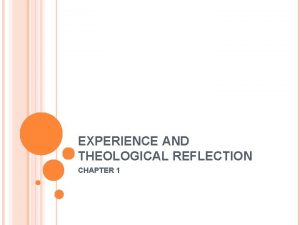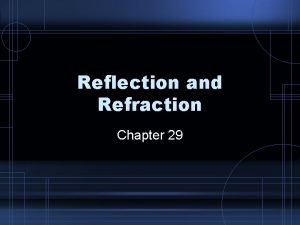THEOLOGICAL REFLECTION AND SOCIAL ANALYSIS FOR MINISTRY I




















- Slides: 20

THEOLOGICAL REFLECTION AND SOCIAL ANALYSIS FOR MINISTRY I: FOUNDATIONS OF THEOLOGICAL REFLECTION Dr. Maureen O’Brien, Ph. D. Duquesne University PART 4 UNIT 12 Click here for instructions.

Instructions � Navigation through the course will occur by clicking on the following action buttons located in the lower right corner of each screen: The HOME button will be placed in the center of each slide and will bring you to the Table of Contents for further navigation. The NEXT and BACK buttons will move you through the course content. The EXIT button will be placed at the end of each Unit and will return you to the course menu.

Instructions � This course is meant to be self-paced, though there will be opportunities to interact with your local and global JPIC groups. � Course content and activities should be completed in the order that they are presented to maximize student success. � The Table of Contents will be your starting point for each Unit

Activity Icons � � Each type of course activity has a unique icon located in the upper right corner of the screen. In this course you will: Create doc Local discussion Reflect Read online Global discussion Watch video Quiz/test Online journal

Part 4: Developing Habits for TR in Your Ministry Unit 12: Imagining and Adapting TR in Your Ministry

Table of Contents � The unit is divided in several components. Start with 12. 1 Description of Learning Journal OR click on the link below to navigate to the component where you left off. Revisit as needed. � 12. 1 Description of Learning Journal � 12. 2 Learning Outcomes � 12. 3 Preparatory Questions � 12. 4 Micro-lecture � 12. 5 Reading � 12. 6 Discussion Questions � 12. 7 Closing Exercise

Description of Learning Journal � Your Learning Journal is the place to record your responses to questions placed in each unit, as well as any notes that you take on the readings or in group discussions. These may be hand written or typed into a computer. If you type, please remember to save your work. Whenever possible, we encourage you to share your Learning Journal with other students in your own group and in other groups through the course’s online networking sites.

Learning Outcomes � By the end of this unit, students should have: � Learned some possible adaptations of TR, and studied an example � Begun to consider how the TR method used in the course can be adapted for their own contexts and ministries

Preparatory Questions � Reflection and response to the following questions is an important way for you to begin thinking about the content of the upcoming unit. Please record your responses in your Learning Journal or hand write them in a notebook if you prefer. You are not expected to share this information with others unless you choose to do so.

Preparatory Question 1 � Drawing upon your past experience and the surfacing of your important gifts, qualities or competencies from Unit 11, what is one significant type of ministry to which you feel called? For example: liturgical celebration, outreach to the poor, pastoral counseling, retreat preaching, catechesis, etc. � Go to Learning Journal (MS Word)

Preparatory Question 2 � What is one particular audience to which you feel especially called? For example: youth, the poor, people with AIDS, migrants, etc. � Go to Learning Journal (MS Word)

Micro-Lecture View the Lecture (02: 57) Read the Text of the Lecture

Reading � Instructor’s Notes � Pastoral Team of Bambamarca. Vamos Caminando. Trans. John Medcalf. London: SCM, 1985. Print. [182 -83]. � Go to Duquesne University’s E-Res

Discussion Questions � Reflect and respond to the following questions in your Learning Journal as you work through this unit. � Then, please choose your response to one of the Discussion Questions that is especially important to you. Paste that response into a Wiki posting in order to promote and participate in a larger discussion with other students, locally and internationally. All of your Discussion Question responses should be brought into your Group Meetings. �

Discussion Question 1 � In the Vamos Caminando reading, can you locate the four elements of TR? If so, where? Are any omitted? How and why do you think they have been adapted? Do you agree with these adaptations? � Go to Learning Journal (MS Word) Go to Learning Journal (Wiki) �

Discussion Question 2 � Look up the Scripture readings for next Sunday’s liturgy. Imagine a group for whom you would prepare a homily or other spoken reflection using these readings. How would you incorporate the four elements of TR? � Go to Learning Journal (MS Word) Go to Learning Journal (Wiki) �

Discussion Question 3 � Reviewing the type of ministry and audience you named in response to the Preparatory Questions, how might you adapt TR for these? � Go to Learning Journal (MS Word) Go to Learning Journal (Wiki) �

Closing Exercise � After completing the reading and participating in the group meeting and Google Group discussion, take time to write in your Learning Journal in response to the following questions. You are not expected to share this information unless you choose to do so.

Closing Exercise � After the reading and discussion, take time to write in your Learning Journal: � What one or two important questions or insights will you carry forward from this unit? � What people and activities could help you to continue TR once you are finished with this course? � Go to Learning Journal (MS Word)

Wiki �If you are ready to respond to the Discussion Question most important to you: �Click here to go to the JPIC 200 Wiki. Sign in so that you can post your entry. � Choose the appropriate Unit Number � Click reply to add your entry.
 Theological reflection questions
Theological reflection questions Examples of theological virtues
Examples of theological virtues Regular reflection
Regular reflection Pontius pilate the crucible
Pontius pilate the crucible President of dallas theological seminary
President of dallas theological seminary Boston theological institute
Boston theological institute Meta ethics vs normative ethics
Meta ethics vs normative ethics Theological pyramid
Theological pyramid Trinity theological seminary of south florida
Trinity theological seminary of south florida Types of theological research methods
Types of theological research methods Trinity theological seminary of south florida
Trinity theological seminary of south florida Ministry of community development and social services
Ministry of community development and social services Social thinking social influence social relations
Social thinking social influence social relations Social thinking social influence social relations
Social thinking social influence social relations Social learning theory example
Social learning theory example Weather model reflection
Weather model reflection Kontinuitetshantering i praktiken
Kontinuitetshantering i praktiken Typiska novell drag
Typiska novell drag Tack för att ni lyssnade bild
Tack för att ni lyssnade bild Ekologiskt fotavtryck
Ekologiskt fotavtryck Varför kallas perioden 1918-1939 för mellankrigstiden
Varför kallas perioden 1918-1939 för mellankrigstiden
